‘There were plenty of sore heads at Bletchley Park’: In their own words – how Britons celebrated VE Day 75 years ago
Dancing, drinking, singing and diving in fountains were all in order as country marked end of war, although for some the fighting was not yet over. Five people who lived through this moment in history tell Colin Drury how they remember it

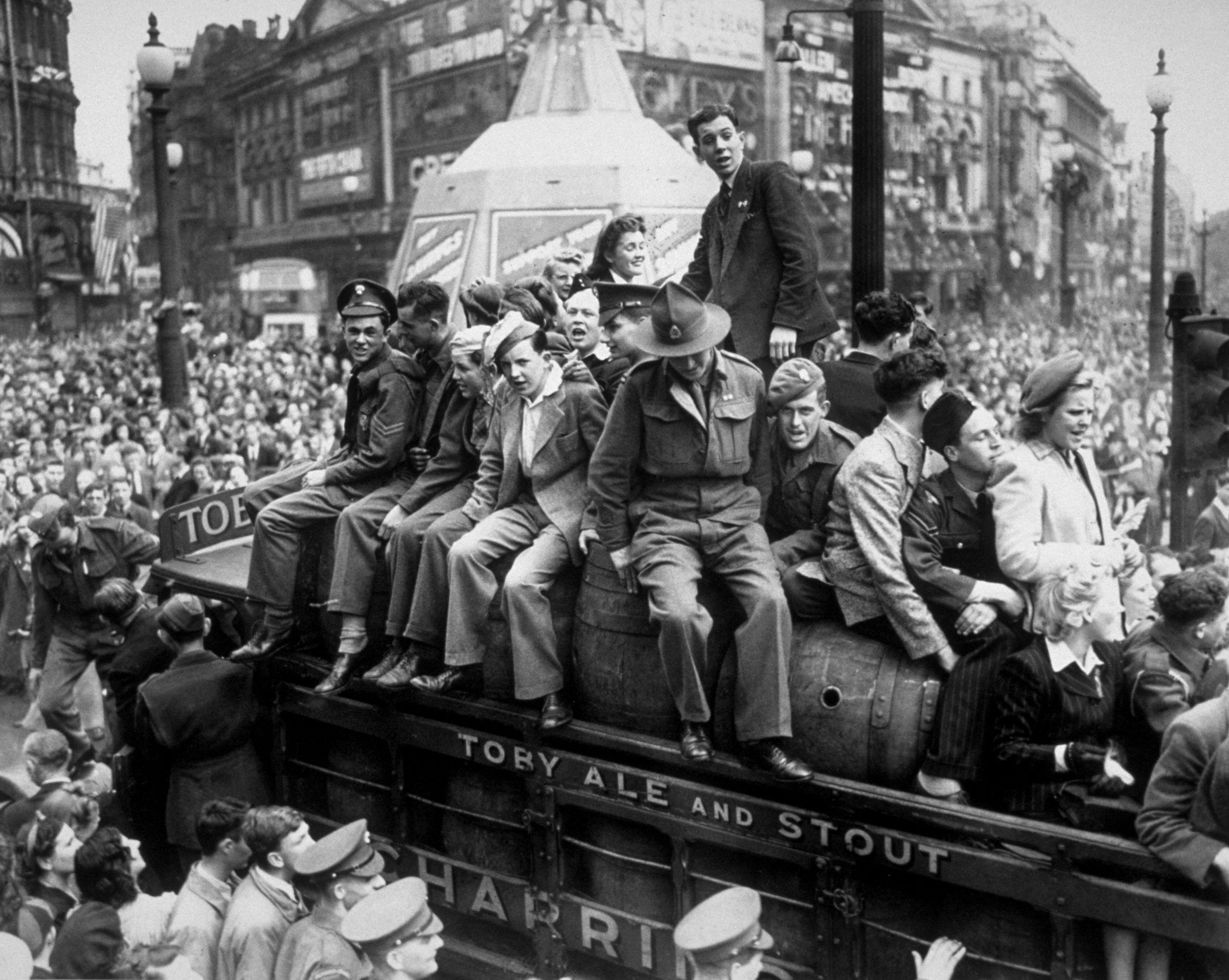
When he took to the balcony at the Ministry of Health on 8 May, 1945, Winston Churchill – cigar in mouth – did what he had done many times before and captured the mood of the nation.
“In all our long history,” he told the crowds below, “we have never seen a greater day than this.”
This was exactly 75 years ago on Friday, and Great Britain was celebrating the end of World War Two in Europe.
VE Day came after Nazi Germany had unconditionally surrendered to the Allied forces, brining to an end almost six years of fighting on the continent.
The announcement – actually made the evening before – was met with mass jubilation across the country.
Street parties and bonfires were held. Bunting was slung up in every city, town and village. An edict was sent by Churchill himself to the Ministry of Food: make sure the pubs do not run out of beer.
And, while on 9 May the hard work of beating Japan would continue, VE Day would become vividly imprinted on the memories of all those who were there.
Today, on its 75th anniversary, five people who lived through this monumental moment of history tell The Independent what it was like to be alive and to be there.
‘There were plenty of sore heads at Bletchley Park the next morning’
Betty Webb, 95, joined the Auxiliary Territorial Services in 1941, aged 18. After basic training she was posted to Bletchley Park, in Buckinghamshire where code crackers famously deciphered enemy messages.
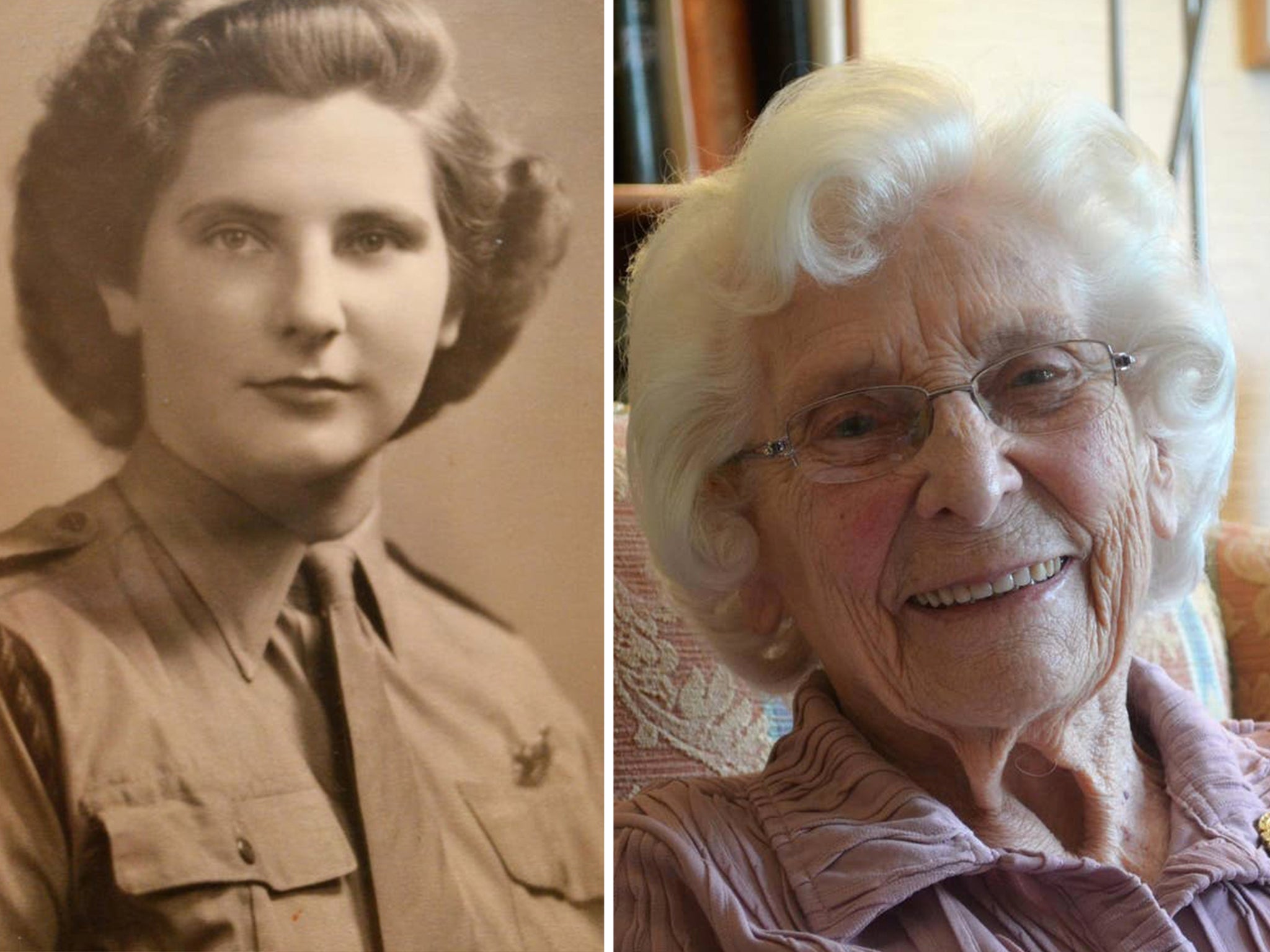
“The main thing I remember about VE Day was the size of the crowd in London. I’d never seen one so big. It had a life of its own; carrying you with it from the moment you got off the train. For most of that day, you didn’t consciously decide where to walk, you just got taken along. Now I think about it, I’m not sure it was safe. But I was young and we’d just won a war.
I was 18 and living in Shropshire when I joined the Auxiliary Territorial Service in 1941. After six weeks training, I was sent to work at Bletchley Park. It was mainly clerical stuff – breaking codes is beyond me – but I’d wanted to help the war effort ever since it started so it was exciting to be involved. Truth be told, I never realised how important what we were doing was until long afterwards.
I can’t remember the exact moment I was told the Germans had surrendered.The rumours were swirling before we got official notice. Some of us decided to head to London. The train down was packed. The atmosphere was so jolly: elation, delight, excitement.
It was the same when we arrived. We got off somewhere by the Thames and were just taken away by the crowd. People were dancing and cheering and waving flags. There was a lot of Vera Lynn being sung. I met a friend at some point – a Jewish woman who had actually fled Germany – and that added to how poignant it all was.
I can’t remember what time we left for home again. Not too late because we had work the next day. I was fine but there were plenty of sore heads around Bletchley Park the next morning. I don’t think anyone minded that.
We were still at war with Japan, of course, and in June that year I got posted to work at the Pentagon in the US. It was an incredible experience and on 15 August, when Japan surrendered, I got to celebrate VJ Day in Washington. I remember, for 24 hours, there was a non-stop racket of car horns blaring out and people in the streets again: it was quite similar to London, although with more food available in the restaurants.
I’ve done a lot in my life since then. I moved to Birmingham and became a recruiting officer with the territorial army and I have three step children and several step-grandchildren. But I will always consider myself fortunate to have witnessed both those celebrations.”
‘Surrendered Germans arrived on horseback – so we took them and held races in the fields’
Fred Duffield, 95, was parachuted into Germany, behind enemy lines, on 24 March 1945 and was still there when VE Day was announced. Today, the great grandfather lives back in Leek where he is originally from.
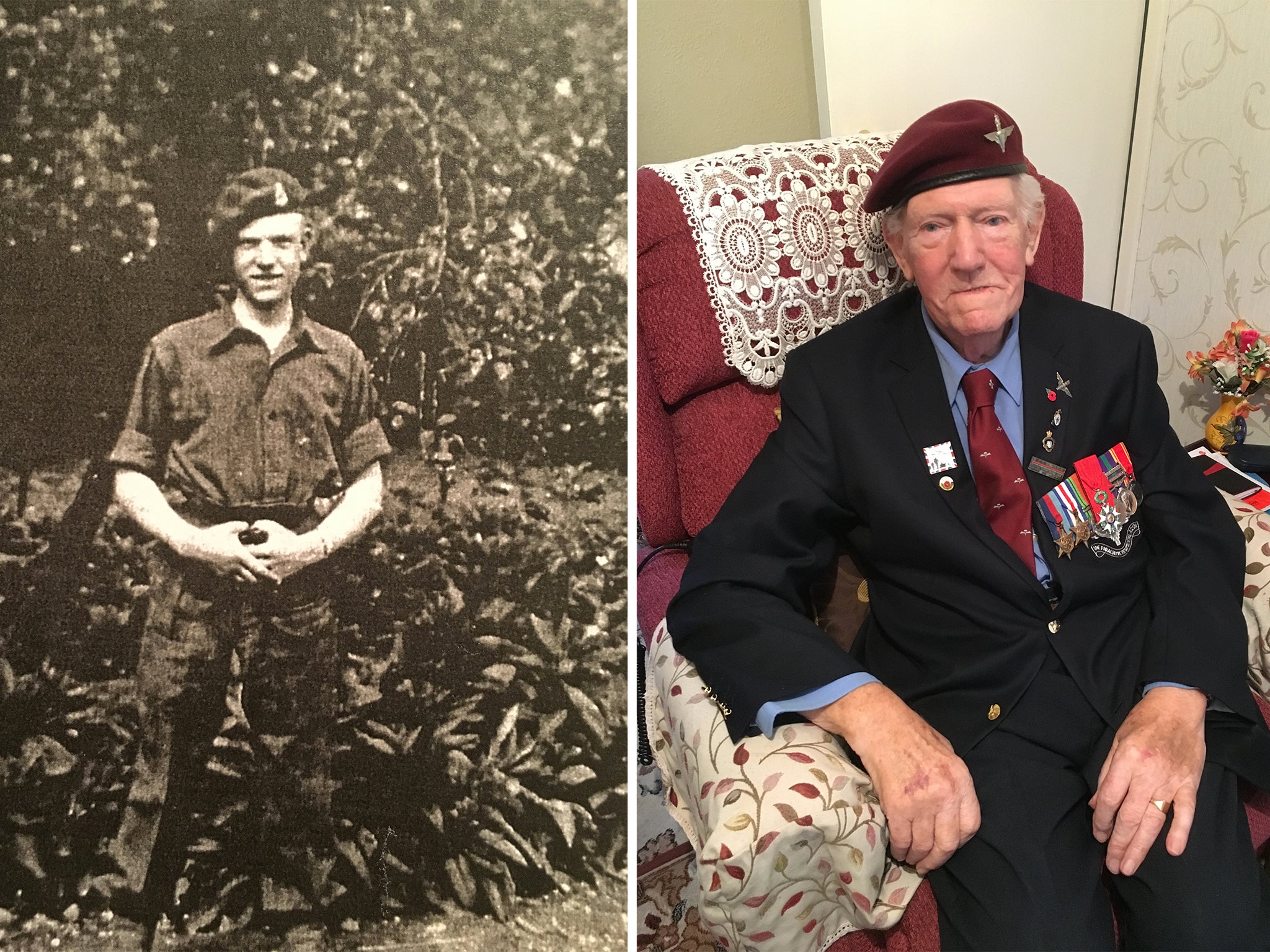
“It was 24 March when I was parachuted into Germany. People sometimes think the war was all but over then. It wasn’t. The Germans were still fighting like mad. British soldiers were still being killed.
I remember us walking down a road one night and hearing ‘achtung’, and then a machine gun being fired at us. I dived in a ditch. I’ve never moved so fast. I buried my face in that mud as far it would go while the bullets flew over us. I was a boy still I thought my time was up. I lay in that ditch for an hour, praying to God. Perhaps he heard.
We were in the village near Wismar on VE Day itself.
I don’t remember there being an announcement but the news got round: it was over. And then slowly, thousands of German soldiers started coming down the road, hands up, fleeing from the Russians on the nearby eastern front. We rounded them up on a football field, set up a machine gun and told them that if they tried anything, they’d be shot. But they didn’t. They were defeated.
We had to search them and I remember finding a photo on one lad. “Meine frau,” he said. “Meine frau.” He had tears in his eyes and I gave it him back. It wasn’t my place to steal a man’s photos.
Toasting victory wasn’t easy in that village because there was no beer or wine to be had. But many of the surrendered Germans had arrived on horseback so we held races in the fields all day – a kind of gymkhana – and then at night we soaked a load of old timber in paraffin and the colonel, on a white horse, lit it with a flaming torch.
We stayed there for a day or two after that, then we were all gathered around and told that BLA didn’t stand for British Liberation Army anymore – it stood for Burma Looms Ahead. We were transported back to England for some brief leave and then we were sent off again to fight the Japanese.
Well, they’d surrendered by the time we actually arrived but we ended up going to Malaysia, Singapore, Java and then Palestine. It was February 1947 before I got home. VE Day felt a long way off by then. In many ways, it had been just the start of more hard work and danger.”
‘I didn’t want the day to end, I wanted to keep dancing all night’
Joan Hall, 95, joined the Women’s Royal Air Force when she was just 17 and worked as a stewardess at a command camp. She travelled to London on VE Day to join the celebrations in Trafalgar Square.
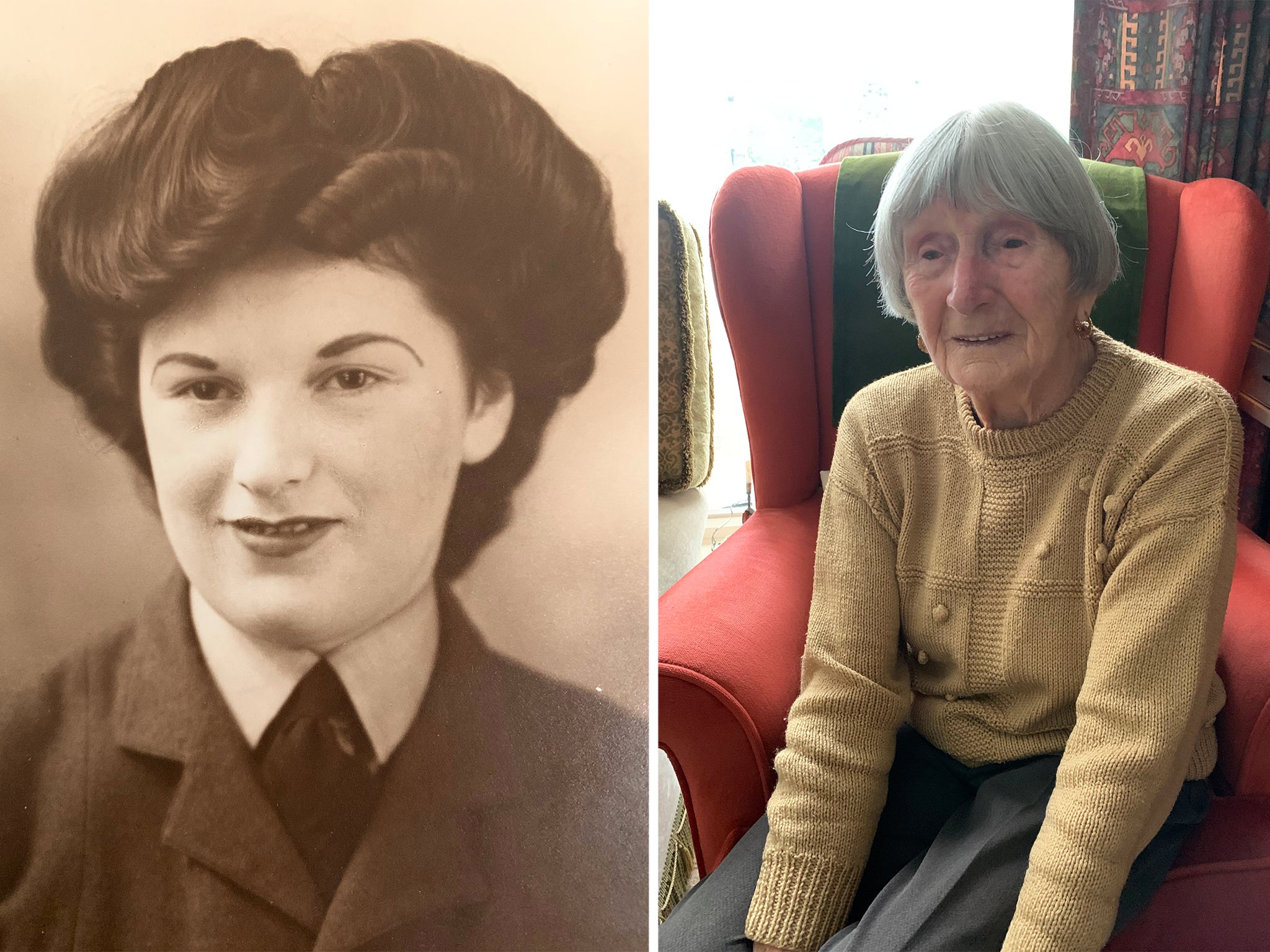
“The best way I can describe Trafalgar Square that day was as one big party. There were all nationalities there, soldiers and airmen in uniform, and civilians all dancing and drinking, hugging and kissing. Did I kiss anyone? I expect so. Why not?
I was 17 when I joined the Women’s Royal Air Force. I wanted to do my bit for the war effort but I confess I also liked the idea of being a young woman living away from home. That just wasn’t done in those days until you got married. It was an adventure.
In any case, I became a stewardess in the mess hall at coastal commend in Middlesex. I served food essentially but there were 20 of us girls living in a hut together so it was quite an experience.
We knew VE Day was coming for some time before it happened and one of the girls and I had planned to get a train to London. It was a wonderful day, the sun seemed to be shining especially and people were diving in the fountains, dancing in the streets. running in and out of pubs. The restaurants were all doing as much food as they could on rations, and people were stood in big queues. You couldn’t get a table anywhere but it didn’t matter. I couldn’t tell you how many people I talked to or danced with that day. It was all a whirl.
Our train back to camp was at 11pm and we sat on it, still talking away. I think we saw fireworks from the window. When we got back, there was still a dance going on in the hall and we ran into that – anything to keep the day going. We didn’t want it to end, I wanted to keep dancing and making noise all night.
After the war was over, I moved back to Birmingham where I was from originally. I met my husband while working in a record shop, we had a son and moved to Gloucestershire where I still live now – and where I continue to dance twice a week at a local hall.”
‘It was special, English, Americans and Commonwealth people all celebrating together. Black and white as one’
Albert Jarrett, 96, moved from Jamaica to join RAF ground crew in 1942 and was based in Sutton Coldfield helping build Spitfire planes. After the war, he became a bus driver and then a TV engineer.
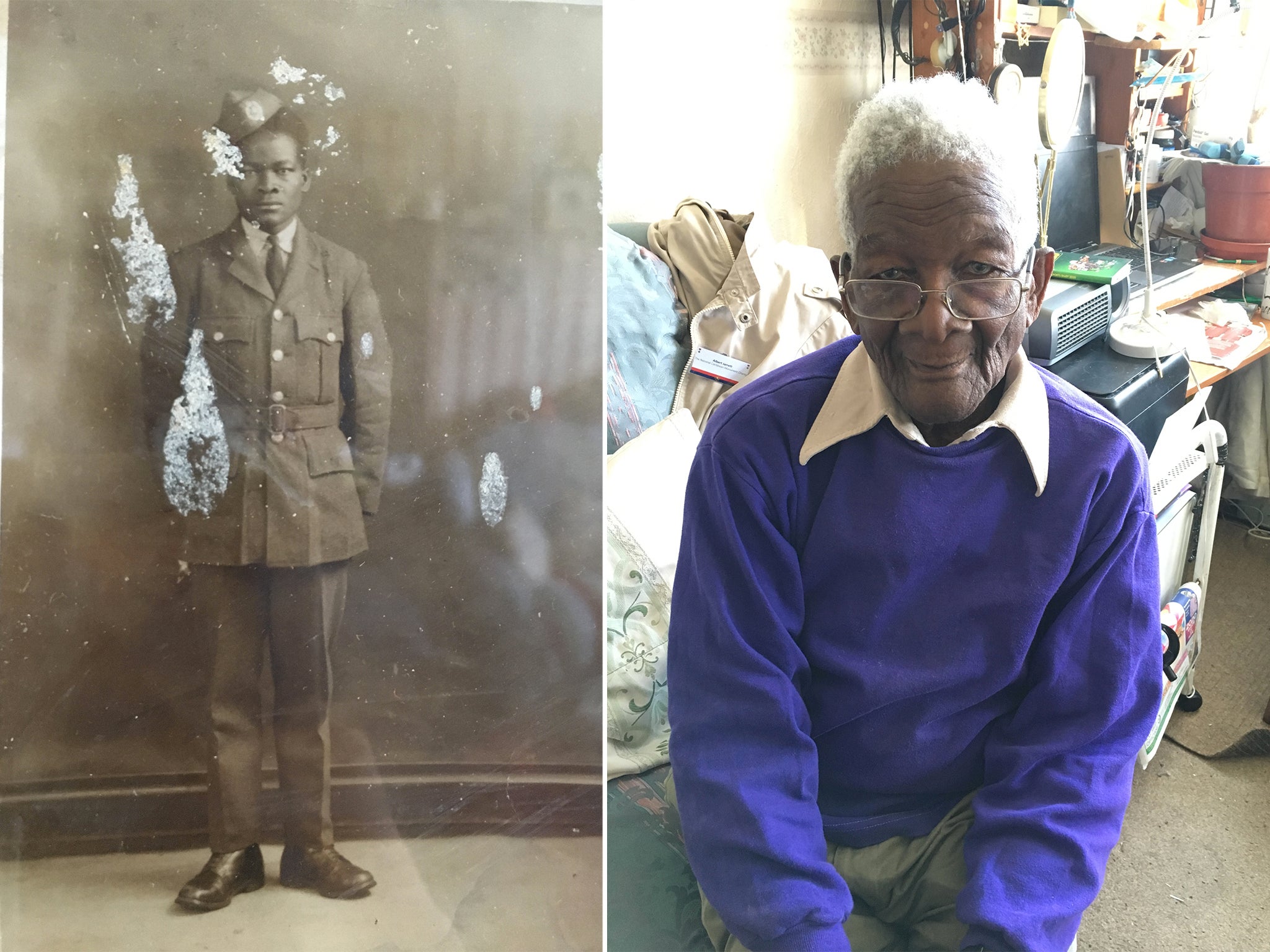
“I’m 96 now and there’s so much I can’t remember anymore. You wouldn’t believe how your own memories disappear. I wish I knew where they went. I wish you could keep them safe somewhere. But I can tell you this: I will never forget VE Day. It was one of the best days of my life. It was joyful.
I came to Britain from Jamaica to help with the war effort. I was 18. There was no conscription but I had always felt – we were educated to feel – I was a British citizen, that this was the mother country, that we were all one people. I felt an obligation to come and do my bit. We all did. Thousands of us. We left our homes to do our duty.
At Sutton Coldfield. I was part of a team moving Spitfire parts around so they could be put together. It was hard but I wanted to be here helping.
We knew the war in Europe was ending but, when victory was announced, it was the most marvellous feeling. I remember our commanding officer that morning telling us to disappear, to go out and celebrate.
It was a lovely day and all the town was out. I’d never seen so much bunting. We went everywhere, the park and the pubs, laughing and dancing and enjoying the sunshine.It was special; English, Americans and Commonwealth people all celebrating together. Black and white as one.
Well, that didn’t last. I moved home to the Caribbean in 1946 and then returned to Birmingham 1953 when there was a call for bus drivers.
But it was different by then. Some people didn’t want you here and they made that clear. I lost count of the number of times I got told to go back home. It hurt. Go back home? Well, no-one ever told me that when I was here in uniform. No-one ever said it when I was helping build Spitfires.
I told myself those who said it just showed their own ignorance. I ignored them. I had no regrets, really, and still don’t. I’ve been here almost 70 years now. I have four children and nine grandchildren and they’ve all gone to good universities and got good educations and good jobs. They’re all happy, and that’s good enough for me.”
‘I missed it all. I was sleeping on a boarded-up train travelling through Germany’
Mervyn Kersh, 95, was part of the D-Day landings and was travelling through Germany when VE Day was announced. The now great-grandfather did not know peace had been declared until he arrived in Belgium several hours later.
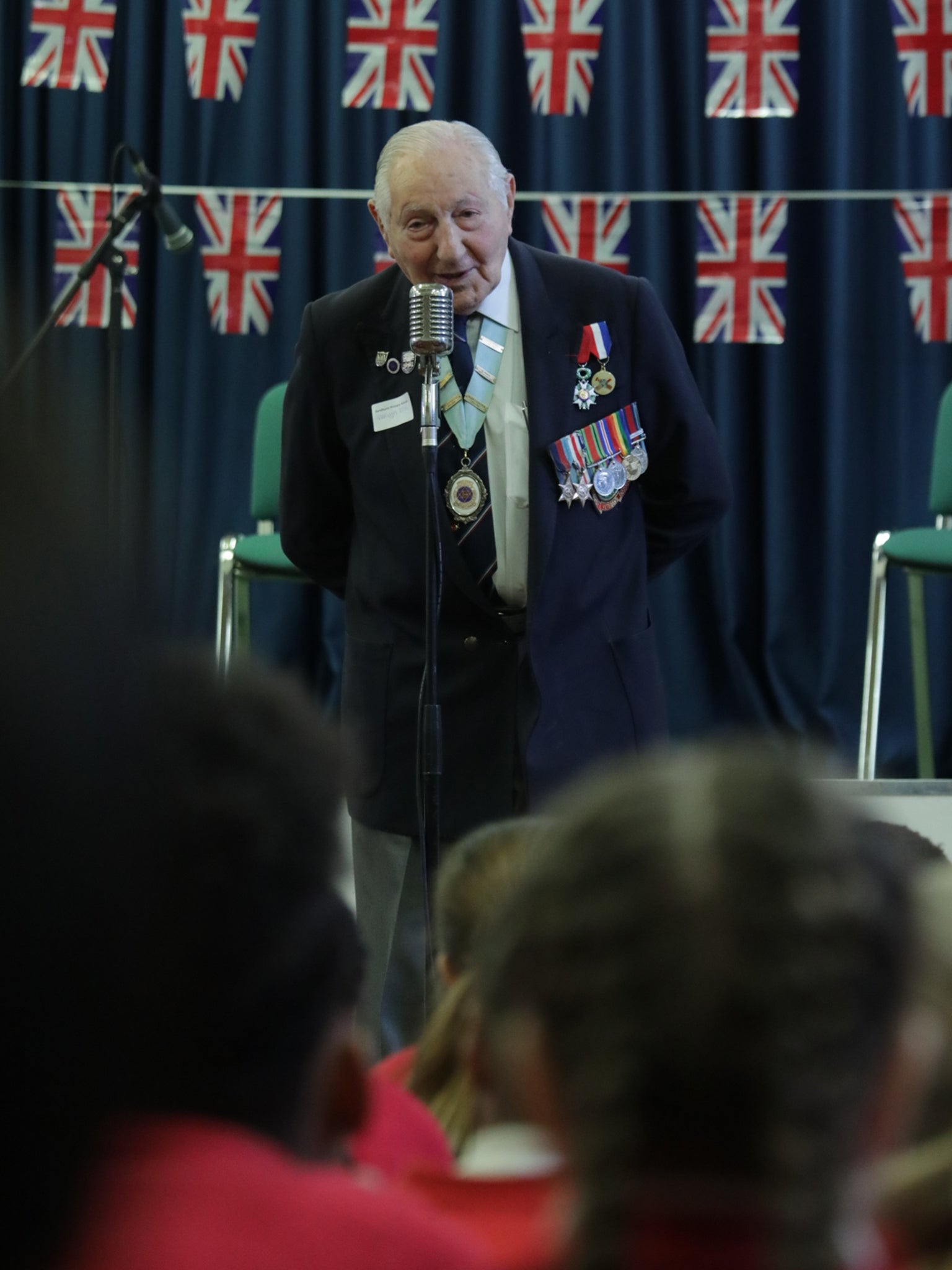
“People have often asked me what I did on VE Day and I’m afraid the answer is rather disappointing. I missed it all. I was on a boarded-up train, travelling through German, asleep with no knowledge the war was over. What a shame.
I arrived on the continent 11 months earlier as part of the D-Day landings. I remember being on the boat that day and seeing the Normandy coast and I don’t mind admitting feeling real fear at what was to come. How do you cope with that? You can’t do anything else. You push it down and get on.
I was one of the lucky ones. I survived. Over the next year, we pushed through Belgium, Holland, Luxembourg and into Germany. I was posted to Celle, a town near the Bergen-Belsen concentration camp. I wasn’t allowed inside because there was typhoid spreading but every day I collected chocolate from other British soldiers and gave it to those well enough to come out. I have never been shown so much thanks for such a small gesture.
After a couple of weeks there, we were told Germany was virtually defeated and we were to head back to the UK to go and fight in Japan. We boarded a train at Hamburg for Bruges. It was a 30 hour journey, I seem to think. The windows were all boarded up in case any Germans tried to shoot at us. It was hot and airless and no-one came in or our of our carriage. I slept for most of it. There was nothing else to do.
So, it was only when we arrived in Belgium we were told the war was over. Well, we were delighted of course but disappointed to have missed the celebrations. The Belgians treated us very well – like heroes – they gave us food and drink and we sang and danced. But I was sorry not to have been at home in London.
Still, it meant that when we got back a couple of days later, we could celebrate all over again. My parents were pleased to see me, I can tell you, when I knocked on the door.
As it happened, I never did go to Japan. I suppose they heard I was coming and surrendered. Instead I was sent to Egypt for 18 months.
For me, I have to say, I was very happy to have seen victory in Europe but I hope no-one ever has to see anything like it ever again.”
Join our commenting forum
Join thought-provoking conversations, follow other Independent readers and see their replies
Comments
Bookmark popover
Removed from bookmarks